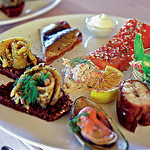There are many nuances when it comes to copyright ownership of recipes created by a chef while employed at a restaurant, but there are some simple ways for a restaurant owner to protect recipes created by a chef from copyright issues.
The easiest and simplest way is for the chef to sign a written employment agreement or a “work made for hire” document (if the chef will not be a formal employee) before starting employment at a restaurant. Under this document, all recipes created by the chef belong to the restaurant, even if they were created on the chef’s own time and using ingredients and equipment purchased and owned by the chef.
Without a proper agreement in place, the chef will have a legal basis to claim that any recipes the chef creates on his/her own time off the restaurant premises and using personal equipment and ingredients belong to the chef, not the restaurant. Recipes created and recorded before the term of employment belong to the chef, even if they are used on the restaurant menu while the chef is employed there. Such exceptions should be listed in the written agreement with the chef.
Of course, the agreements mentioned above should be adjusted to suit the specific parties involved, so be sure to seek legal advice on the exact wording so that it covers your intent precisely.
There are also rules about what constitutes a copyrightable recipe:
- The recipe must include preparation instructions or other information beyond just a list of ingredients.
- The recipe must be recorded in writing or an electronic media (not just in the chef’s head).
Work that has not been recorded on a tangible medium is not copyrighted, but as soon as a recipe has been recorded, it is copyrighted. A formal copyright registration is not required, although it’s recommended, because you cannot file a lawsuit for copyright infringement unless the copyright is registered. This registration requirement is the same rule that applies to other copyrighted works.
Because recipes are so intrinsically a part of both the restaurant’s reputation and the chef’s reputation, it is prudent to execute a properly worded agreement that covers ownership of all recipes created by the chef during the term of employment.

